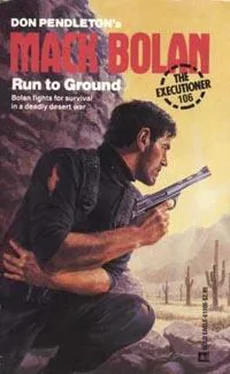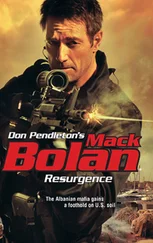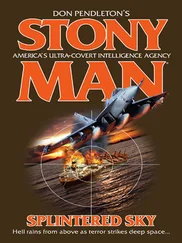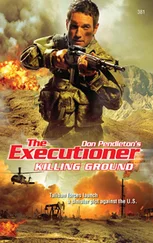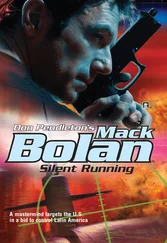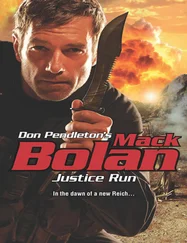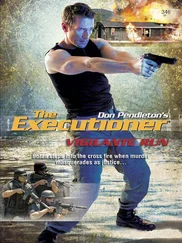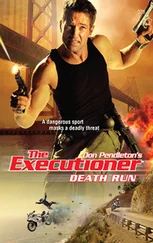Don Pendleton - Run to Ground
Здесь есть возможность читать онлайн «Don Pendleton - Run to Ground» весь текст электронной книги совершенно бесплатно (целиком полную версию без сокращений). В некоторых случаях можно слушать аудио, скачать через торрент в формате fb2 и присутствует краткое содержание. Жанр: Боевик, на английском языке. Описание произведения, (предисловие) а так же отзывы посетителей доступны на портале библиотеки ЛибКат.
- Название:Run to Ground
- Автор:
- Жанр:
- Год:неизвестен
- ISBN:нет данных
- Рейтинг книги:3 / 5. Голосов: 1
-
Избранное:Добавить в избранное
- Отзывы:
-
Ваша оценка:
- 60
- 1
- 2
- 3
- 4
- 5
Run to Ground: краткое содержание, описание и аннотация
Предлагаем к чтению аннотацию, описание, краткое содержание или предисловие (зависит от того, что написал сам автор книги «Run to Ground»). Если вы не нашли необходимую информацию о книге — напишите в комментариях, мы постараемся отыскать её.
Seriously injured in the brutal firefight at the druglord's rancho, the Executioner is trapped in an ever-tightening circle of doom.
As the noose closes around him, can Bolan summon the strength to prevent the annihilation of his desert sanctuary?
Run to Ground — читать онлайн бесплатно полную книгу (весь текст) целиком
Ниже представлен текст книги, разбитый по страницам. Система сохранения места последней прочитанной страницы, позволяет с удобством читать онлайн бесплатно книгу «Run to Ground», без необходимости каждый раз заново искать на чём Вы остановились. Поставьте закладку, и сможете в любой момент перейти на страницу, на которой закончили чтение.
Интервал:
Закладка:
"You've obviously given this a lot of thought," she said. "I happen to believe there's too much violence in the world already."
"Granted. But you don't eliminate the problem by ignoring it or forming a discussion group. You'd know that if you'd ever tried to talk a rapist or a killer into reconsidering his crime beforehand."
The shadow had returned to haunt her eyes, and now Rebecca Kent was looking at him strangely, looking through him, with her thoughts a thousand miles away. When she regained her voice, it was as distant as her gaze. "I don't presume to judge you, Mr. Bolan, but I can't believe you'll save the world by killing everyone who disagrees with you."
"If that was the plan of action, Doctor, you'd be dead already. We're not talking philosophical agreement here. It's raw survival, plain and simple."
She got up, restless, tried the telephone again, then sat back down. "Still dead," she said by way of explanation.
Bolan was not startled by the news. He would have bet that all the lines in town were dead, and they would stay that way until somebody on the outside had their fill of listening to busy signals and reported something wrong in Santa Rosa. Depending on the timing of that call, it might be hours more before a lineman started checking out the wires and found the point where they had been brought down by insulated cutters or a well-placed charge of buckshot. Hours more, perhaps, to fix the break, and only then would anyone begin to think about what might be happening in town.
Rivera would be finished with his work by then. Whatever he might have in mind for Santa Rosa, he would have time to spare before the outside world had an inkling of what was happening. The soldier wondered what would happen when the drug lord showed himself, how citizens of Santa Rosa would react. The constable would be outgunned, but he might rouse the townspeople, given half a chance, and offer some resistance to the occupying army. Individuals might take up arms against Rivera, in defense of homes and families. The dealer's mercenaries would have modern, paramilitary weapons and an old familiarity with murder on their side. In combat situations, Bolan knew, the numbers only mattered if the quality of troops on either side was roughly equal. Half a dozen seasoned veterans could stop an untrained army in its tracks, defeat them with a small assist from Fate.
Unless the inexperienced militia should get lucky.
In his youth, the Executioner had seen the plot spun out a hundred times on movie screens and television. Farmers, simple people, laying down their plows and taking up their guns against the bandits who were threatening their homes. It didn't matter if the heavies rode on horseback or on motorcycles, in a Model T or in the turret of a Panzer tank: the story was the same. In films, the good guys won because it made a better story, and you needed heroes if you meant to keep on selling popcorn at the matinees. In life, however, it was something else again.
In Vietnam and afterward, the Executioner had learned that there was never any guarantee of happy endings. In a real-life close encounter with the Reaper, you were satisfied if you could walk away, and never mind the hypothetical about what had been gained or lost. The winners were the living, and the losers got a toe tag for their trouble. A few days in the ground, and they would all look pretty much the same.
But it still mattered, damn it. Any way you stood the rule book on its ear, a few hard basics always read the same. Like good and evil, right and wrong. The fact that certain crimes against humanity could simply not be left unpunished, if humanity itself was to retain its meaning. Certain enemies were simply wrong, and you opposed them not because of politics or artificial border lines, but rather out of a concern for all mankind, a recognition that their evil, left unchecked, would constitute a danger to the species. Hitler had been such an enemy, but he was not alone, by any means. You did not have to look in chancellories or throne rooms for an enemy these days. Some of them rode in limousines, but others took the bus and bore a strange resemblance to the boy next door. You took them where you found them, and when you found them, you were ready for them, or they served you up for dinner like a sacrificial lamb.
The sound of wailing sirens cut the noonday heat like razors ripping parchment, drawing closer. Bolan fought a minor wave of dizziness before he regained his balance, then followed Dr. Kent along a narrow corridor to the waiting room.
"Grant got the county sheriff," she suggested, trying to sound hopeful as they peered through separate windows.
"Maybe."
"What else could it be?"
The soldier didn't answer, waiting for the sounds to take on substance, for the source to show itself. It might have been the county sheriff, but there was an alternative that came to mind.
It might be Doomsday.
For the Executioner.
For Santa Rosa.
12
Esteban and his companions rendezvoused with Rivera bearing their collection of assorted small arms from the hardware store. Rivera heard them out, dismissed the deaths of two more gringos as inconsequential. Something else had happened on the brief foray to town — he read it in the eyes of Jorge and Ismael — but he did not press them for details. In a few more hours, nothing they had done would matter in the least. It would be over, finished, and Rivera could relax.
Rivera's trademark was a mixture of audacity and caution. Always careful when it paid off, the dealer knew precisely when to gamble on the long odds, risk his life, if need be, in pursuit of wealth and power. He had risen through the ranks on nerve alone, and made his fortune in a business where strength alone was not enough to guarantee survival. Early on, he learned that cunning was essential in his chosen trade. While other dealers hid behind their walls and barbed-wire fences, trusting in their private armies, he had infiltrated their territories, sniffing out ambitious underlings, recruiting them as spies in hostile camps. The major dealers had ignored him, for the most part, totally preoccupied with their omnipotence until, one at a time, he had eliminated them. In five years time, Rivera had arisen from the gutter to command the largest private army in Sonora, dealing marijuana, heroin and cocaine to syndicates throughout the States. His reputation as a winner was established, but he knew that it could all be taken from him, just as he had taken it from others.
There had been other challenges before, but none as serious as that which he was facing now. On previous occasions he had seen the trouble coming, recognized its source, and moved to neutralize the danger in advance. Two dozen small competitors, and half as many larger ones, had come to grief because they thought that they could prey upon Rivera's empire, emulating his old tactics, using them against the king himself. But they were gambling on his own forgetfulness, the apathy that sometimes comes with power, and they had been fatally mistaken in their estimation of his cunning.
For Rivera had forgotten nothing, and he took no chances with his own subordinates. His payroll was extravagant, perhaps, but he was buying loyalty from the soldiers in his ranks, the lawyers and accountants who were necessary evils in a business such as his. He paid them more than they were worth, and let them know precisely what they stood to lose by crossing him, betraying him to his competitors. Whole families had disappeared upon the rare occasions when a traitor was exposed, and Rivera's personal ferocity, his thirst for disloyal blood, was legendary with his gunmen. Some of them had witnessed the punishments he had inflicted, and they spread the word, embellishing the stories until he emerged as something of a demon cast in human form. Rivera did not mind; the legends served a useful purpose, and his richly padded payroll was a form of cheap insurance, well worth the investment.
Читать дальшеИнтервал:
Закладка:
Похожие книги на «Run to Ground»
Представляем Вашему вниманию похожие книги на «Run to Ground» списком для выбора. Мы отобрали схожую по названию и смыслу литературу в надежде предоставить читателям больше вариантов отыскать новые, интересные, ещё непрочитанные произведения.
Обсуждение, отзывы о книге «Run to Ground» и просто собственные мнения читателей. Оставьте ваши комментарии, напишите, что Вы думаете о произведении, его смысле или главных героях. Укажите что конкретно понравилось, а что нет, и почему Вы так считаете.
